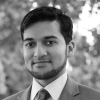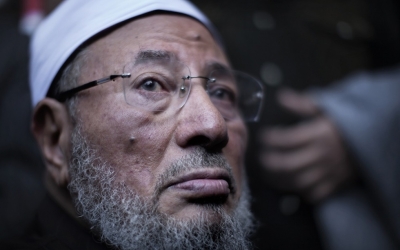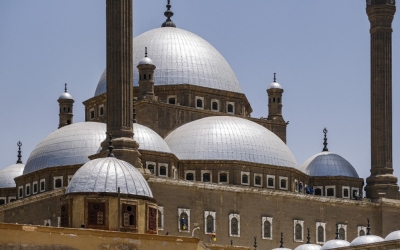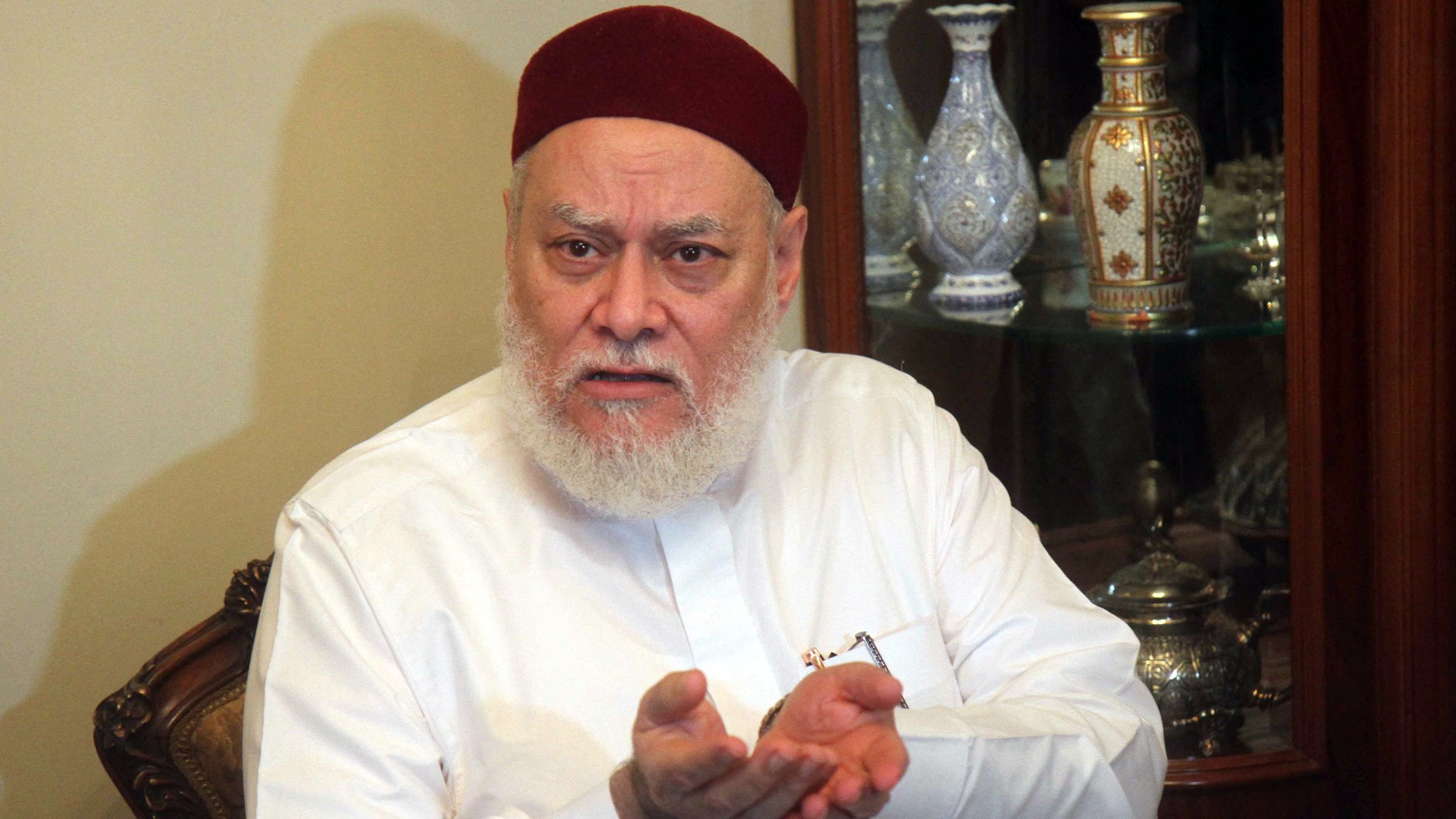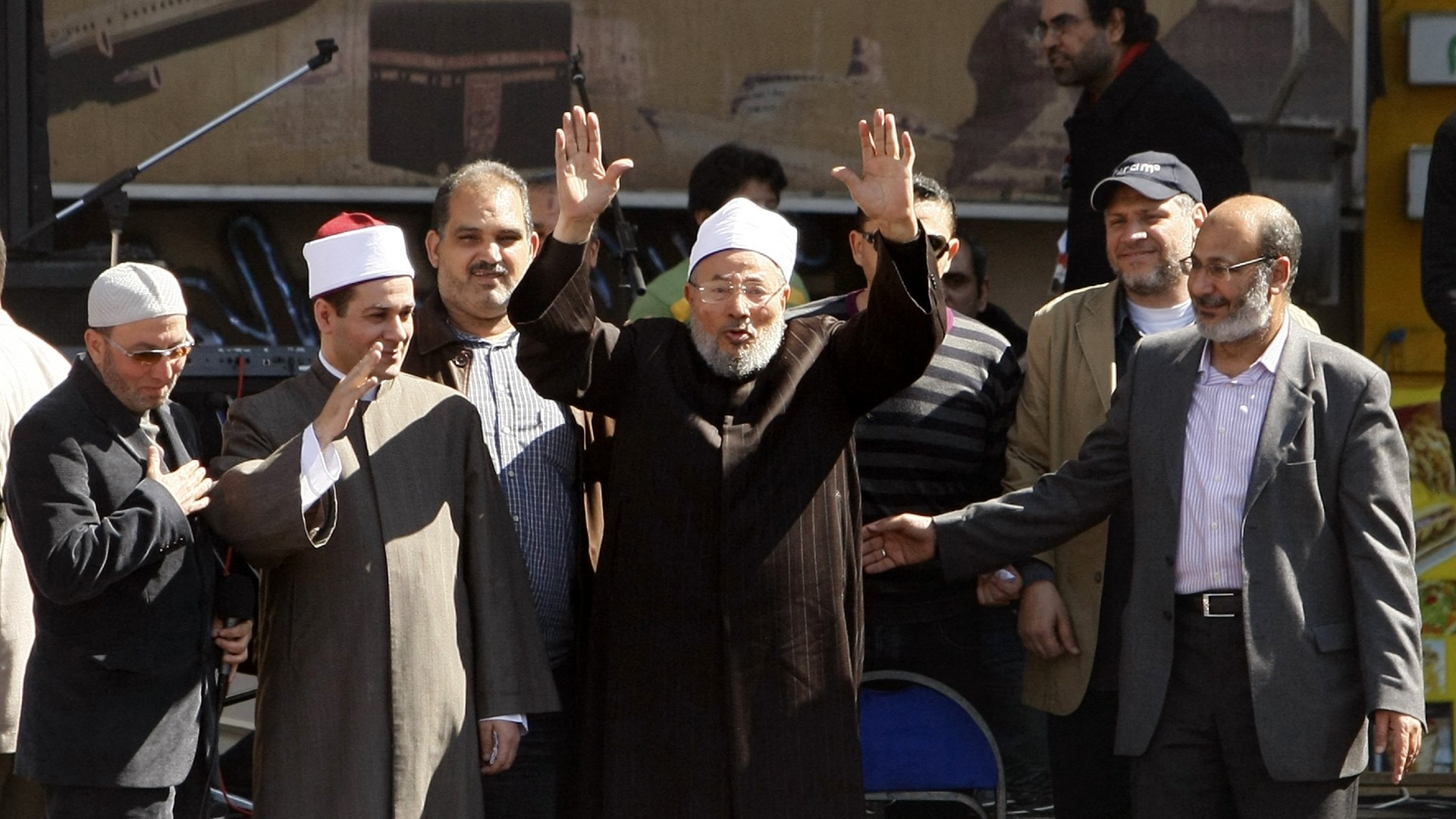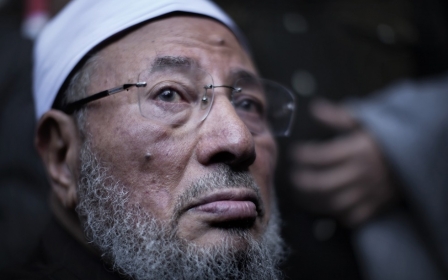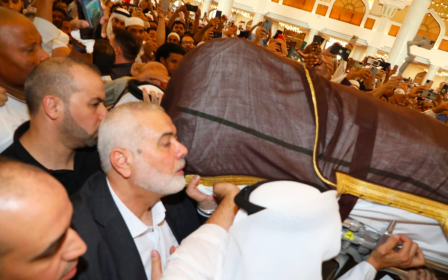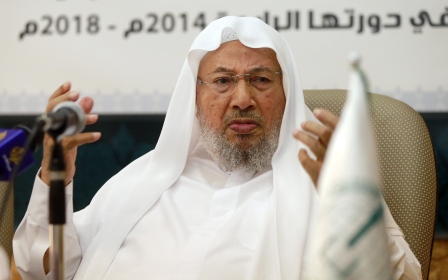Yusuf al-Qaradawi and the scholars of the sultan
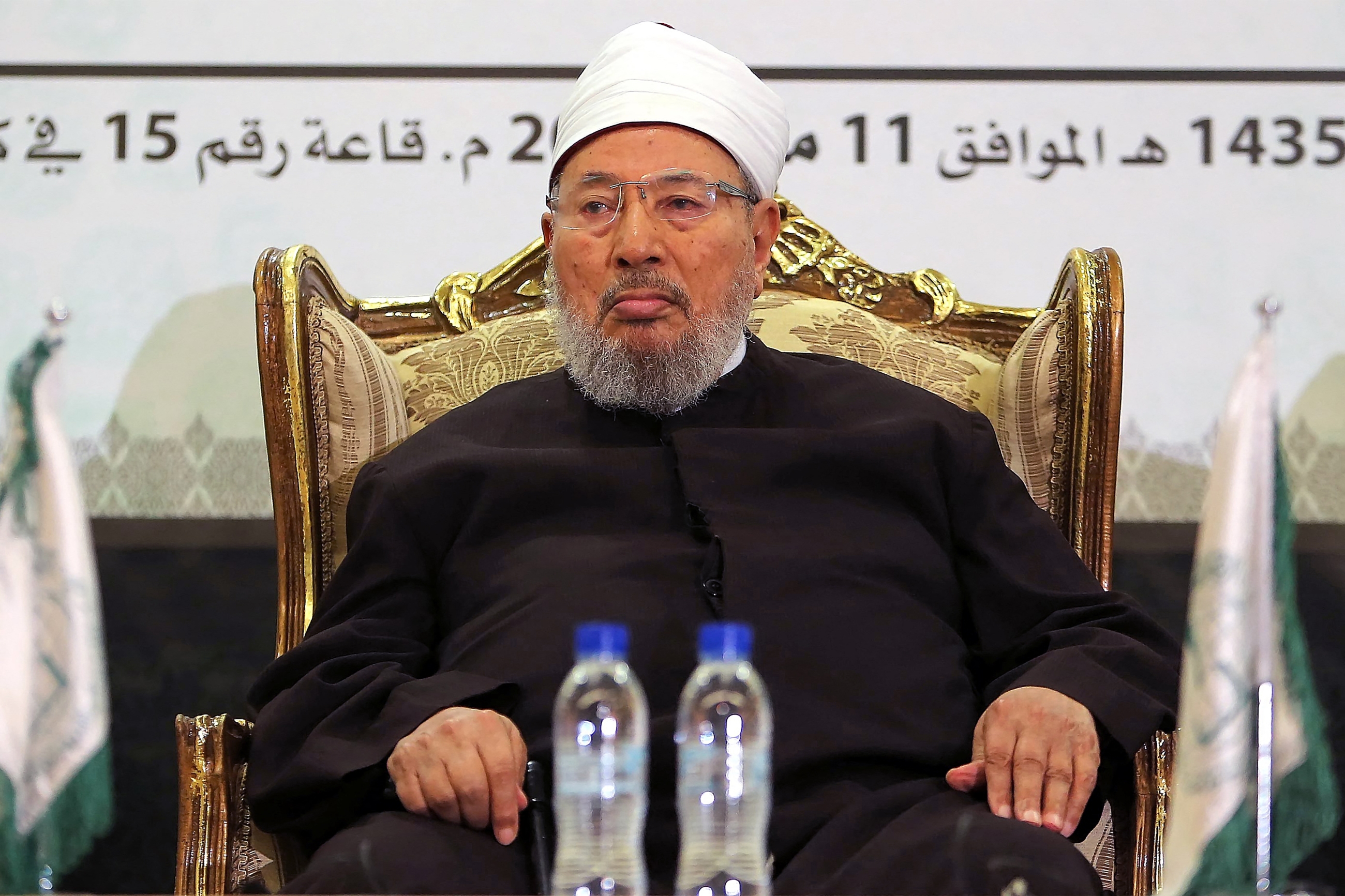
If there was one constant throughout the long career of the late Yusuf al-Qaradawi, it may well have been his belief in the obligation to speak truth to power.
That is not to claim that he always lived up to this belief, or that his judgement in such matters was always beyond reproach. But throughout his life, Qaradawi appears to have been almost constitutionally incapable of remaining silent in the face of what he perceived as injustice.
Qaradawi’s retirement in the mid-2010s, and his passing last week, leaves Islamic scholarship at something of a crossroads
One of his earliest writings, from his mid-20s, was a short play entitled The Scholar and the Tyrant, a theatrical re-enactment of the historical persecution of the noted early Islamic scholar and political dissident, Sa‘id ibn Jubayr, by the tyrannical early Muslim military general, al-Hajjaj ibn Yusuf, both of whom died in the year 714.
The play illustrates the kind of stance Qaradawi already admired in his 20s as an aspiring scholar-activist, that of a righteous scholar standing up to a tyrant and being killed for it. Ultimately, however, the tyrannical al-Hajjaj got his comeuppance soon after Ibn Jubayr’s killing, dying a horrible death from illness within a month of his execution of Ibn Jubayr.
Qaradawi, like scholars before him, uses this episode to suggest that ultimately, divine justice is destined to be served.
New MEE newsletter: Jerusalem Dispatch
Sign up to get the latest insights and analysis on Israel-Palestine, alongside Turkey Unpacked and other MEE newsletters
Opposing tyranny
As was the case in his early career, Qaradawi's activism in his later years could be seen as an extension of his life-long commitment to opposing tyranny. Towards the end of his life, in the context of the Arab revolutions, Qaradawi emerged as a vocal critic of dictatorship in the Middle East.
With his passing, some of the most prominent remaining scholars in the Middle East are state-sponsored scholars supportive of autocracy.
Indeed, one of the darker sides of the Arab counter-revolutions of the past decade has been the emergence of pro-autocracy transnational Islamic institutions and networks that perversely mirror the kinds of independent transnational religious bodies that Qaradawi pioneered in the 1990s and 2000s.
The Arab counter-revolutions have bequeathed to us new challenges, and Qaradawi’s retirement in the mid-2010s, and his passing on last week, leaves Islamic scholarship at something of a crossroads.
Prior to the revolutions, pro-democracy Sunni Islamists like Qaradawi had maintained a modus vivendi with scholars of various other tendencies. These included scholars from Shia, Sufi, and Salafi orientations whose attitudes towards democracy and autocracy was not particularly salient.
Indeed, the International Union of Muslim Scholars which Qaradawi helped establish and chaired from 2004 welcomed scholars from all of these theological orientations and did not ask whether they supported democracy or autocracy.
Uncompromising attitude
But the Arab revolutions of 2011 initiated a process that transformed this regional status quo, reconfiguring old alliances and antagonisms. As some scholars have observed, Qaradawi’s own engagements in this - particularly his uncharacteristically severe condemnation of Shi‘ism owing to Iranian support for Syrian President Bashar al-Assad's atrocities - contributed to the post-Arab revolutionary polarisation.
But an equally polarising stance for many of his scholarly colleagues, ensconced as they were in the institutions of various states throughout the region, was Qaradawi’s hostility towards autocracy, and his vocal advocacy of democracy.
For Qaradawi, in many of the conflicts that arose in the region, this appears to have been a non-negotiable point of disagreement. He seems to have held that people’s repression was something that scholars could never turn a blind eye to, and in this regard, his attitude was not without precedent in the traditions of Muslim religious scholars.
In some ways, this uncompromising attitude was out of character for Qaradawi. For much of his career, he was known for his ability to navigate contentious debates while maintaining goodwill on both sides. He had adopted a largely conciliatory approach on matters of theological contention between Sufis and Salafis, and encouraged mutual respect and understanding between the major sectarian orientations of Shia and Sunni Islam, while clearly maintaining his own Sunni stance.
But theological difference was one thing; the opportunity to confront the entire entrenched system of dictatorship that governs the Middle East was another thing entirely. In the last fifteen or so years, he became less conciliatory towards the Shia, partly, it would seem, due to the systemic sectarianisation of the Middle East after the 2003 invasion and occupation of Iraq by the United States.
With the onset of the Arab uprisings of 2011, his suspicion of Iranian intentions in the region were soon borne out in the Iranian intervention in Syria. Consequently, his anti-Iranian rhetoric would eventually embrace a sectarian frame.
Polarisation among scholars
More generally, his vocal advocacy for democratic change in 2011 was met with opposition from many of his Sunni scholarly colleagues, most notably those who were working in an official capacity for the regimes Qaradawi was excoriating in his public statements. In the past, he had actually enjoyed cordial relations with many of those who would emerge as his scholarly opponents from 2011 onwards.
In some cases, these were scholars who found fault with the stridency of Qaradawi’s pro-democracy activism in the face of potentially deadly autocratic opposition. In other cases, these were scholars who had entirely bought into the role of serving autocratic power that they had been asked to fulfil.
Among his colleagues, Abdallah bin Bayyah is the most senior to have parted ways with Qaradawi during the polarisation that marked the 2013 counter-revolutionary change of fortunes in the early Arab revolutionary period. Bin Bayyah who had long admired Qaradawi and once called him the “conscience of the global Muslim community (umma)” formally parted ways with Qaradawi in September 2013, a few weeks after the Egyptian Rabaa massacre.
Within months, he would be appointed as the president of a newly formed “Forum for Promoting Peace in Muslims Societies” that had been set up by the UAE’s foreign minister - a figure who had been an active instigator of the 2013 Egyptian coup and the Rabaa massacre that followed.
Other scholars with whom Qaradawi had earlier enjoyed good relations included the current Rector of the Azhar, Ahmad al-Tayyib.
The day before the first protests of the 2011 Egyptian revolution, Qaradawi had been invited by him as a guest at an ecumenical conference at the historic al-Azhar University where both Qaradawi and Tayyib had studied in their early years.
But as Egypt’s most senior religious official, who held the rank of a minister in the Egyptian state, Tayyib opposed the 2011 revolution and offered support for the Egyptian coup of 2013, although he expressed his dismay at the violence and bloodshed that followed.
A third senior scholar, and one whose reputation beyond Egypt has been most sullied by his anti-revolutionary activism, is Ali Gomaa. I extensively examine Gomaa’s deadly interventions in post-coup Egypt in my book, Islam and the Arab Revolutions.
A long establishment stalwart, he shocked even his supporters when it became public that he had offered the Egyptian security forces full-throated religiously-grounded encouragement to massacre potentially thousands of anti-coup protesters on the streets of Egypt in 2013.
Gomaa has been lavishly rewarded by Egypt’s General-turned-President Sisi for his loyalty and continues to enjoy a prominent position in Egyptian public life nearly a decade later. Qaradawi forcefully condemned these scholars’ fatwas during this period, but by this time, the polarisation between pro-democracy and pro-autocracy scholars had become insurmountable.
Two of Gomaa’s acolytes are the younger scholars, Ali al-Jifri and Usama al-Azhari, who both worked in the service of Egypt’s dictator. For several years, al-Azhari has acted as Sisi’s official religious adviser, and the UAE-based Jifri has remained an active voice in supporting Sisi and other regional dictators in the face of the “Muslim Brotherhood threat.”
The Brotherhood is perceived by these scholars as instrumentalising democracy in order to gain political power. While these younger scholars do not have the same stature as some of their older counter-revolutionary mentors, their relative youth means that they may well become increasingly influential in propping up regional autocracy for decades to come.
A complicated legacy
Setting aside the various other dimensions of his long and remarkable life, Qaradawi’s legacy after the Arab counter-revolutions has thus been decidedly mixed.
Qaradawi's long-standing practise of speaking his mind and making forthright criticisms undoubtedly contributed to some polarisation
Some have argued that he contributed considerably to the polarisation that arose from the Arab revolutionary spark by recklessly advocating forcefully for democracy in a region where entrenched military power was decidedly concentrated in the hands of authoritarian state forces.
On the other hand, the polarisation was primarily engineered by states in the region, most notably Egypt, Iran, Saudi Arabia, Syria, and the UAE. In some cases - those of Egypt, Saudi Arabia, and the UAE - the states needed to foment just enough instability to illustrate their own indispensability. In others- such as Syria, backed by Iran- the states were engaged in an existential war to the death, often invoking sectarian rhetoric in the process.
In the context of this extreme polarisation, Qaradawi could be seen as a relatively minor player in relation to these states. Yet, his long-standing practise of speaking his mind and making forthright criticisms undoubtedly contributed to some polarisation.
This was all the more true in the context of the fear felt by Middle Eastern dictatorial states, many of which saw the Arab Spring as an existential threat. Morally speaking, Qaradawi seemed to be saying that the existential fear of these states had no standing. Practically, however, they could not be dislodged despite their lack of moral standing.
These dictatorships were never going to go down without a fight, and Qaradawi’s critics like Bin Bayyah and Gomaa have argued that advocacy for even “peaceful” revolution was always guaranteed to become violent in this context. What weakens the arguments of such critics is, of course, these scholars’ willingness to become mouthpieces and rubber stamps for these dictators in their repression of their populations.
Islamic advocacy symbol
Ultimately, the polarisation that followed the 2011 revolutions created the conditions for public facing Islamic scholars to side either with dictators or with the people, or potentially to try to studiously avoid political commentary of any kind.
The severity of the repression in the context of the ongoing counter-revolutions has meant that Qaradawi’s long-standing commitment of speaking truth to power has few emulators today.
And while plenty of scholars have decided to maintain a prudential silence in the face of overwhelming odds, one of the darker legacies of this period has been the rise to central prominence of the full-throated pro-autocracy scholar, examples of whom have been mentioned in the foregoing.
With the passing of Qaradawi, perhaps the most significant, if inevitably imperfect exemplar of speaking truth to power among contemporary Islamic scholars is gone. And with him, an important symbol of Islamic advocacy for democratic reform in the Middle East is no more.
A new generation of scholars and activists can still recognise that the work Qaradawi, and so many others have dedicated themselves to over the past decade - the work of socio-political reform in the face of extraordinary repression - continues unabated.
Qaradawi, like many who have passed on before him, can be seen as both an inspiration and a lesson in the limits of any human endeavour. But his legacy of speaking truth to power will doubtless be emulated by future generations so long as autocracy persists.
The views expressed in this article belong to the author and do not necessarily reflect the editorial policy of Middle East Eye.
Middle East Eye delivers independent and unrivalled coverage and analysis of the Middle East, North Africa and beyond. To learn more about republishing this content and the associated fees, please fill out this form. More about MEE can be found here.


